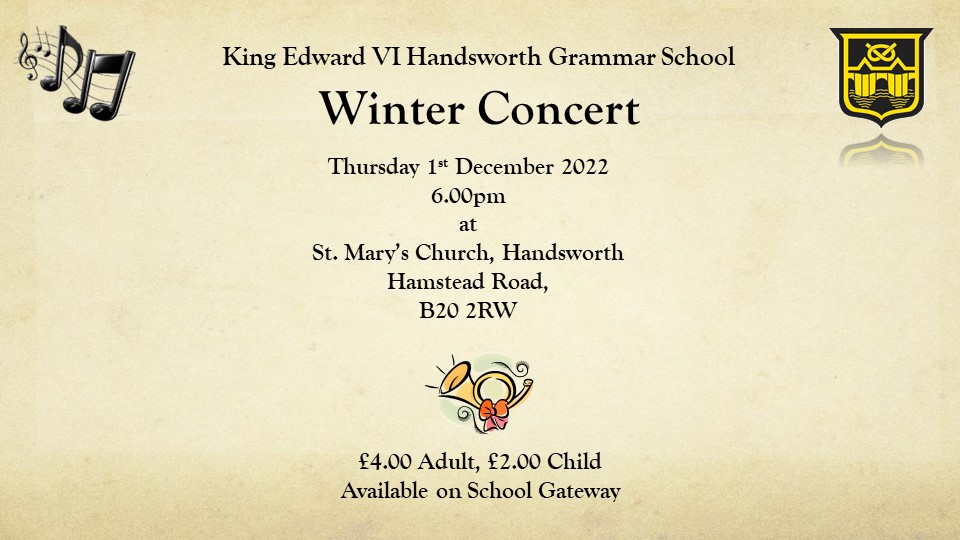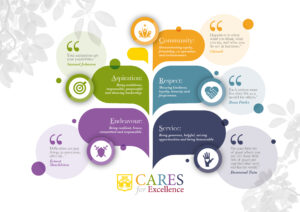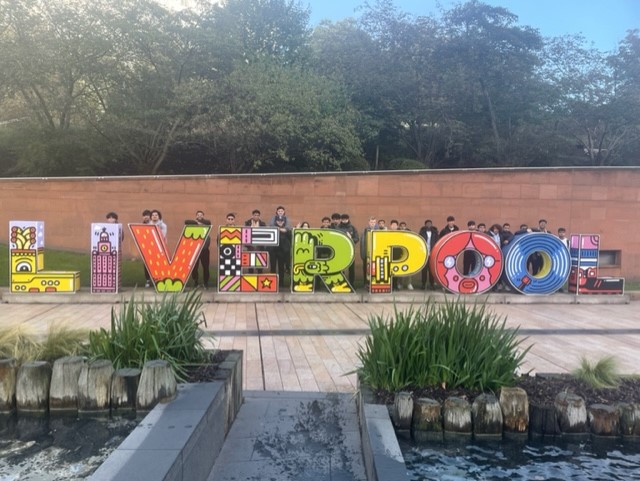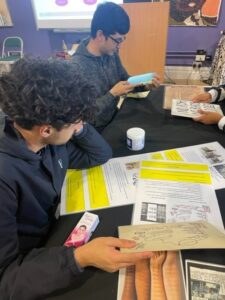Year 7 Football – Cup win under the lights!
Congratulations to the Year 7 Football Team who are through to the Semi-Final of the Aston Cup after their Quarter-Final victory (6-3) on Thursday. All the boys were excellent ambassadors for the school, with three pupils making their debut performances. We wish them all the best of luck for the remainder of their cup run.
Remembrance Assembly 2022
King Edward VI Handsworth Grammar School for Boys held its annual Remembrance Assembly in Big School on Friday 11th November 2022. We held the Assembly so that Year 7 attended in person whilst the remainder of school had an extended Form time in which the Assembly was live streamed via Teams and we all observed a 2-minute silence at the same time. We welcomed a number of guests to HGS who represented the Bridge Trust Society, the Charity called Handsworth Grammar School and the Military.
The Reverend Dr Bob Stephen who is Chair of the Governing Body led the act of Remembrance. The Headmaster delivered a very timely and thought-provoking introduction which highlighted the necessity to work towards peace in all we do. He highlighted that important facets of life such as showing respect and tolerance of each other, being kind and compassionate and celebrating our differences are all highly significant steps on the road to peace. He emphasised the need for the values of peace, freedom and hope in all we do as well as focusing upon the themes of unity and compassion.
Our guest speaker was Major Brown who spoke about his varied and full career in the Army to date as well as what Remembrance means to him as a professional and on a personal level. It was very moving to hear about his experiences which have taken him around the world in a variety of roles. He reflected on the loss of life, the ultimate sacrifice that people make in times of conflict and the hope for peace and reconciliation through acts of remembrance and humanitarian aid.
Haec Olim Meminisse Iuvabit
Focus on Education November 2022
One of the greatest gifts we can give to our children is the ability to live happy and independent lives. When they leave school at 18, they will then be prepared to take responsibility for their own choices and to forge successful futures – and we can only hope that their choices will be morally-informed and that their futures will be shared generously with others.
The worst sort of education is therefore one which encourages spoon-feeding, however attractive this appears at the time and whatever the short-term, easy gains. Unfortunately, the nature of GCSE exams can sometimes encourage this (‘teaching to the test’), and it is important that we teach pupils to play the game according to the rules; however, it is also vital that they learn to think for themselves.
This approach begins early and positively at HGS: we pitch questions back at pupils rather than giving them the answers; we tell them it’s fine to make mistakes and thus learn from them; we encourage them to be curious; we challenge them to grapple with a problem when the solution is not immediately forthcoming; we set them both independent and collaborative tasks; and we take them out of their comfort zone in a supportive environment. We hope that this gradually builds self-confidence, so that they have the resilience and wherewithal to enjoy the challenges and to overcome the difficulties which will surely come their way from time to time in adult life.
In short, we enable our students to use their knowledge carefully, to be informed, to know what to do when they don’t know what to do. To become a Force for Good.
But most importantly, in addition to hard work and determination to achieve exceptional academic results, it rests on five values.
You will be constantly reminded of these in the months and years ahead. You’ll find them on posters, forming part of your learning and the House System and they will serve as a foundation for how we believe you need to live your life at school, and how you subsequently live your life when you leave.
Community, Aspiration, Respect, Endeavour, Service.
HGS CARES
If you embrace these values, if you show ambition in everything you do, whether it is in Geography or Football, if you keep resilient and determined whatever challenges life throws at you, if you’re humble and can walk with Princes and Paupers, if you show love and care and kindness in all your dealings, and if you can really support others in their darkest of moments by showing compassion in your words and your actions, you will not just simply be a fine young person, you will be a role model to others – a true Handsworth Grammar student who leads by example. A force for good through your actions and deeds, which will stay with you your entire life.
Stay well and safe.
Be kind to yourself and others.
Best wishes,
Dr Bird
Belgium Trip, October 2022
The trip was very moving and it opened all of our eyes to the horrors of the Great War. We visited several memorials and cemeteries (including Tyne Cot and Essex Farm), where we placed wreaths for the Handsworth Grammar School ‘Old Boys’ who had lost their lives. The sheer number of people that died, and the number of bodies that haven’t been identified was terrible; our tour guide told us that about 1/5 of the people that died are still unidentified. In Ypres, there were only a few non-European graves; the most at a single cemetery was 12, but there were many names recorded on the memorials, further adding to the magnitude of the number of bodies not found. On the second day, we were privileged to attend the re-dedication ceremony of a grave of a soldier who had recently been identified. We also visited the German Langemark Cemetery.
At the Memorial Museum Passchendaele we saw the kind of conditions soldiers fought and lived in. The stories that our tour guide told us about the trenches made us feel grateful for being alive at this time. Many of the people that died as a result of trench warfare were forced to go ‘over the top’; they were shot down with machine guns. Failing to comply with orders may mean that their own commanders would shoot them for cowardice, something incredibly horrifying to visualise. Some were gassed, and many soldiers ran the wrong way, meaning the gas eventually caught up with them. We were told by our tour guide that the actions of the man that developed the gases (Fritz Haber) ultimately led to his own family’s destruction; his wife committed suicide as she couldn’t live with a man that was responsible for the deaths of so many, and his children were ultimately killed by the same gases in gas chambers because they were Jewish.
We learnt a lot about the war and, during a visit to Talbot House, we saw where soldiers could temporarily escape from the horrors of the trenches, and try to relax. The priest who set it up wanted the house to be enjoyed by all, no matter who they were; this was seen as radical back then as society was built on racism and rank. There, we were able to play chess and the piano, and we watched a video of a typical show that would have been performed there during the war.
On the Thursday evening at 8pm we witnessed the moving Last Post Ceremony at the Menin Gate.
We had some ‘down time’ during the trip, enjoying a game of bowling and, on the next evening, we went to play pool at the same venue. Some watched a very important football match which sadly didn’t go to plan as Mr Jones’s team lost! On the last day, we visited the beautiful city of Bruges, which had houses which greatly resembled those of Amsterdam. We enjoyed a canal tour which was very therapeutic and the photographs we captured were amazing. Many of us tried authentic Belgium waffles as well as chocolate, which tasted amazing!
Overall, the trip was thought-provoking and we learnt the scale of the sacrifice. I would like to thank Mr Jones, Mrs Hartt, Mrs Yates and Mr Campbell for the organisation of the trip as it went incredibly smoothly.
Hardev Manku (10W)
Wellbeing Advice
Belgium Trip Update 2
The weather had taken a turn for the worse this morning and so we headed to St. Nicholas Church in Mesen for some refuge from the rain. Here we heard about the Christmas Day truce in 1914, the Battle of Messiness as well as the story of a German soldier who fought locally, Adolf Hitler. We visited Ploegsteert memorial to pay our respects to two more HGS Old Boys, Hal Harper and Frederick Walter Newbury. We then took some time for R&R at Talbot House, just as the young soldiers in WW1 did. We paid our respects at the German cemetery Langemarck. On our final night in Ypres, we are going to observe the last post ceremony at the Menin Gate which I am sure will be a memorable experience for our students.
Mrs Yates
Belgium Trip Update
We have had a very busy but moving and powerful day paying our respects to some HGS Old Boys as well as the Indian War Graves. We have visited Essex Farm dressing station and Cemetery, Tyne Cot Cemetery, Bedford House Cemetary and Ypres Reservoir Cemetery. We toured the Passchendaele Museum and have finished the afternoon by attending a rededication ceremony for a previously unknown soldier, Private G Willcocks. Our student’s conduct has been exemplary, acting with the upmost respect and have done HGS proud.
Mrs Yates
Liverpool Trip
On Thursday 13th October the Year 13 History students went on an eye-opening trip to the International Slavery Museum in Liverpool where we looked through the history of transatlantic slavery and its aftermath. It is located on the very dock where many enslaved Africans and goods were imported and exported through the trade triangle. We saw some examples of their culture such as fabrics from Ghana and jewellery from Benin which displayed that, contrary to the image sometimes painted by colonisers, countries in Africa were civilised in a different way. As we moved through the museum, we found examples of the abhorrent conditions of the transportation of slaves and their work on the plantations. One example that was particularly alarming was the treatment of female house slaves who were in constant danger of being abused and harassed. In addition to this, the long-term effects of discrimination were demonstrated throughout the civil rights movement by the segregation of black people from their “fairer” counterparts and we saw the devastating mental effects of this through the skin colour chart to determine where the slaves were to work.
Reece Qureshi, 13PJO
What is the impact of slavery? During the interactive session at the museum, we learnt about the consequences of slavery playing a role in racial bias. This was shown by the book The Three Golliwogs by Enid Blyton and the repercussions of the racial stereotype on black people the book had. As a result, we reflected on the racism in society that still exists. Furthermore, we learnt examples of modern-day racism and stereotypes based on colour. For example, we were shown a Nivea advert in Africa which showed white skin as fair based on the idea that black is impure and white is pure. We discussed the impact of this on perceptions of colour and superiority. Overall, the session opened our eyes to the centuries of racism which is ongoing today and the challenge to overcome it.
Furqan Waseem, 13PJO
Learning about the horrors of slavery has always been one of my main interests in history. The trip to Liverpool further ignited that passion as the trip was extremely interesting and informative. One of the main parts of the trip was a lesson on the stereotype ‘white = pure and black = impure’, which led to many black people being discriminated against, even after emancipation. It was very interesting finding out about the ins and outs of slavery, and how a countries laws can change, but people’s deep-rooted attitudes remain the same. This trip gave a very good insight on how slavery impacted a lot of people’s lives negatively, and how slavery still exists today in many different forms.
Awais Younis, 13PJO
Slavery has always been an interesting and heart dropping topic to revise and learn about for me personally. The museum gave us a complete overview on how the slaves were treated within these tough times, and certainly gave me much to think about because of the scenes that they were showing. One of the main topics was to do with racial stereotypes, and how badly black people were treated, especially seeing upsetting signs that said, “No Irish, No dogs, No blacks”. We tried to appreciate how disheartened you would feel if you and your family had to experience this every single day, and you had to stay in “safe” areas. Overall, a lot of thought-provoking knowledge was gained from the stories, diagrams and models of the experience of black people across the centuries.
Cameron Claire, 13KOR
Year 11 visits to IKEA
For 12 months our year 11 Business Studies students have been working voraciously in a new and specialised subject and with official social distancing guidelines now over it was a perfect time to visit and apply this knowledge to a major business in action. Luckily, in the land of 1000 trades, there happens to be a major one down the road. The Business Studies department chose to visit IKEA because it is a fantastic institution for students to see what they study in the classroom come alive and gain face to face experience of the world of work. The IKEA business and community departments were fantastic in showcasing to our students how IKEA operates, what it’s like to work there and how employees work and succeed at IKEA. It was a tremendous week of visits that has allowed our students to see what it’s like to work at an institution that values culture and inclusion so highly and where more matters than the margins. However, much to Mr Conway’s chagrin, we regret to report that we returned with no Billy bookcases – but there’s always next year!
Mr Harvey
Business Studies students get sent to the shops
Over the 10th to the 13th of October, 109 Business Studies students, including me, were given an incredible opportunity to witness commerce in the real world, allowing us to comprehend how words in a textbook can be the foundation to earning millions if not billions of pounds for companies and an experience of the world of work.
Our school was able to arrange a trip to IKEA (the Swedish multinational conglomerate). As soon as we arrived in the car park, the blue and yellow building (based on the flag of Sweden) immediately stood out. As the pupils and I headed in, we were greeted by an IKEA employee who was a part of their marketing faculty, and she guided us into the room where we would receive talks about IKEA from employees of different departments. There was first an engaging quiz in which students could test their general knowledge of Sweden, leading to some hilarious answers! After the quiz, different videos were presented to depict how such a large company still had such a firm belief in community and togetherness by showing how much they care for their employees (e.g., by providing subsidised meals) and how they ran events in their local area to support residents. Crucially, students were also able to gain an understanding of the strict conditions products in development must meet like price, quality and function to go on sale. Constantly meeting these stringent requirements over the years in all their products allowed them to become such a remunerative organisation. Finally, the pupils and I were given a tour of the store where would visit sections like gaming and lighting. In this tour, we were given the chance to find sustainable products across the store and discuss them in a group to show how they benefitted the environment. Like all good times, the tour also came to an end and to cap off a rewarding and wonderful day out, students were given the opportunity to indulge in the hot dogs and meatballs available which most, thoroughly enjoyed!
With this deep insight into IKEA and how it functions, I believe that I have a firmer grip on the knowledge I have attained in Business Studies as I can see how the concepts come into fruition for real companies. It was great to see how employees entered the business, the routes they had up the organisation and the relentless commitment IKEA had to diversity and inclusion. It was fascinating to hear how IKEA don’t care about who or what you are but the skills and competencies you have and to hear this from employees who had worked their way up from the checkouts to management positions. Overall, it was a fantastic experience and was invaluable to learning more about entry into the world of work and how businesses operate in real life.
Shrey Kapoor 11H


useful links
site info
T: 0121 554 2794
King Edward VI
Handsworth Grammar School for Boys,
Grove Lane, Birmingham,
West Midlands, B21 9ET
























































